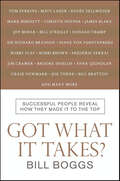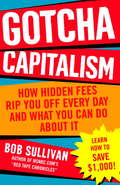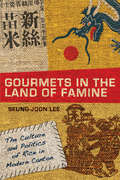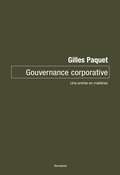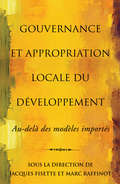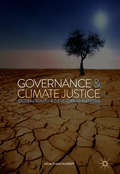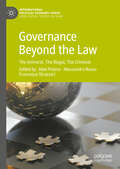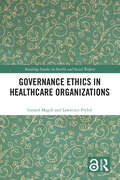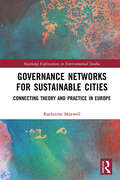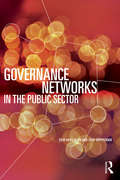- Table View
- List View
Gossip and Organizations (Routledge Studies in Management, Organizations and Society)
by Kathryn WaddingtonGossip is a complex and ubiquitous phenomenon, widely found and variously practiced. Gossip and Organizations provides the reader with an analysis of gossip and informal knowledge across different national, organizational and cultural contexts, drawing upon empirical findings and the author's experiences of researching gossip in nursing and healthcare organizations and higher educational institutions. Kathryn Waddington aims to dispel once and for all the myth that women gossip and men have conversations, shattering the illusion that gossip at work is trivial talk. This book challenges the assumption that gossip is a problem that should be discouraged. While there is undoubtedly a dark side to gossip, Kathryn Waddington argues that paying closer attention to gossip as organizational communication and knowledge enables exploration of other ways of seeing, interpreting and understanding organizations. Gossip is not merely an impediment of organizing, it is a form of organizing which shapes perceptions and actions, and can forewarn managers of future failure in organizational systems. The complexity of gossip is such that a of range inter-disciplinary explanations is necessary in order to account for this form of communication and knowledge across multiple levels and spaces in and around organizations. Waddington provides a new evidence-based framework incorporating ethics, emotion, identity, sensemaking and power as a guide future research, theorizing and critical reflective and reflexive practice in the field of organizational gossip.
Gossip, Organization and Work: A Research Overview (State of the Art in Business Research)
by Kathryn WaddingtonThe premise of this book is that research into gossip, organization, and work is an important idea whose time has come. A key feature of the book is the inclusion of ‘practice points’ showing how – and where – theory and/or research intersect with practice, and vice versa. They are intended as signposts to future thinking and theorizing, tempting readers to venture outside of their ‘home’ disciplines and territories, conceptual comfort zones, and methodological mindsets. The overall aim of the book is to: (i) provide enough information for readers to decide where they might want to go next; (ii) offer some theoretical directions and ethical principles: and (iii) make suggestions regarding what academic-practitioner tools and techniques will help them along the way, including arts-based and mixed-methods research that focus on real word lived experience(s) of gossip. It will be relevant to researchers at all stages of their career: from students at the start of their academic journey, to ‘seasoned’ scholars with more extensive experience. The book is also intended to be readable and relevant to practitioners with academic interests, who seek to reflect critically upon, and develop, their practice in times of turbulence, change, and the COVID-19 era.
Got What It Takes?: Successful People Reveal How They Made It to the Top
by Bill BoggsBeyond talent, what factors have determined and defined the careers of well-known individuals? Training? Risk-taking? Luck? Emmy Award®-winning interviewer Bill Boggs shares success secrets he uncovered in candid conversations with 44 leaders in entertainment and the arts, sports, fashion, the business world, and more, including: Mark Burnett, Craig Newmark (Craigslist.com), Matt Lauer, Anna Quindlen, Renée Zellweger, Sir Richard Branson, Bobby Flay, Brooke Shields, Diane von Furstenberg, Norman Lear, Donald Trump, and Joe Torre, among others. They reveal crucial influences, how they deal with adversity and stress, and the choices they made that helped them to prevail in their careers and in their lives. This is an inside view of what makes the most successful people tick and a lessons-in-life career guide from accomplished stars at the top of their game.
Got Your Attention?: How to Create Intrigue and Connect with Anyone
by Sam HornGOLD MEDALIST IN THE 2015 FOREWORD REVIEWS' INDIEFAB AWARDS IN CAREER!Did you know:• Goldfish, yes, goldfish, have longer attention spans than we humans do?• One in four people abandons a website if it takes longer than four seconds to load?Imagine if there were ways, in a world of impatience and INFObesity, to quickly intrigue busy, distracted people and earn their interest, trust and buy-in? Imagine if there was a process for pleasantly surprising decision-makers and convincing them you're the right person for the job, position, project or contract?You don't have to imagine it, Sam Horn has created it. Sam's innovative techniques have helped her clients close deals and raise millions of dollars and will be your "secret sauce" to getting funded, hired, elected, promoted or referred.
Gotcha Capitalism: How Hidden Fees Rip You Off Every Day and What You Can Do About It
by Bob SullivanWhat is Gotcha Capitalism? Coughing up $4 fees for ATM transactions. Iron-clad cell phone contracts you can't get out of with a crowbar. Paying big bucks for insurance you don't need on a rental car or forking over $20 a day for supposedly "free" wireless internet. Every day we use banks, cell phones, and credit cards. Every day we book hotels and airline tickets. And every day we get ripped off. How? Here are just a few examples of how big business can get you: * You didn't fill up the rental car with gas? Gotcha! Gas costs $7 a gallon here. * Your bank balance fell to $999. 99 for one day? Gotcha! That'll be $12. * You miss one payment on that 18-month same-as-cash loan? Gotcha! That'll be $512 extra. * You're one day late on that electric bill? Gotcha! All your credit cards now have a 29. 99% interest rate. But not for much longer. InGotcha Capitalism, MSNBC. com's "Red Tape Chronicles" columnist Bob Sullivan exposes the ways we're all cheated by big business, and teaches us how to get our money back-proven strategies that can help you save more than $1,000 a year. From the Trade Paperback edition.
Gotham Giants
by William S. KraskerThe owner of a professional baseball team is trying to figure out if promotions are having an effect on ticket sales, and if televising games is hurting attendance. He considers renegotiating the television contract.
Gotong Royong: Toward Sustainable Palm Oil
by Rebecca Henderson Monica Baraldi Hann-Shuin YewIn late 2015, Jeff Seabright, Chief Sustainability Officer at Unilever, had to report to Unilever CEO Paul Polman on the effort to transform the cultivation of oil palm. Historically, palm oil was produced using unsustainable methods that included burning large tracts of forest land which destroyed wildlife habitats, displaced native populations, and emitted greenhouse gases into the atmosphere. Global demand for palm oil was increasing which made the situation worse. Unilever was the largest single buyer of palm oil, purchasing about 3% of global production, and had been an active promoter of sustainable palm oil production. In 2015, 60% of globally traded palm oil was covered by sustainability commitments, up from 5% in 2008, but there was more to be done. Palm oil-driven deforestation and different kinds of social issues continued across the world, especially in Indonesia and Malaysia, which produced 80% of palm oil. The case discusses the sustainability strategy implemented by Unilever across time with regards to palm oil, together with the efforts implemented by other organizations such as the Consumer Goods Forum, the Roundtable On Sustainable Palm Oil, social and environmental NGOs, Unilever's competitors and the local governments in Southeast Asia. What more could Unilever do to advance the diffusion of sustainable palm oil?
Gould, Inc.: Graphics Division
by Ulrich E. Wiechmann Ralph Z. SorensonDescribes the decision of a battery manufacturer to diversify into the computer field through acquisition and the development of a new product. Among the issues to be discussed are the company product fit, phases in new product introduction, product positioning, and distribution strategy.
Gourmets in the Land of Famine
by Seung-Joon LeeFocusing on the rice trade, Lee (history, National U. of Singapore) examines conflicts over the system of food provisioning for the Chinese city of Canton (Guangzhou) between 1900 and 1937 and its impact on the city's food politics and culture. He describes how the viewpoints of local managers of provisioning understood Canton as a part of an international network of trade in maritime Southeast Asia and how this view came into conflict with the nationalist modernizing plans of Sun Yat Sen's Guomindang, who came to see foreign-rice imports at cheaper prices into Canton as a source of trade deficit and outflow of national wealth. He also describes how the international rice trade, spurred in Canton by its place within maritime trade networks and the decline of arable land in the Guangdong and Guangxi provinces, came to impact the dietary preferences of different sectors of the Cantonese urban population. Annotation ©2011 Book News, Inc. , Portland, OR (booknews. com)
Gouvernance communautaire: Innovations dans le Canada français hors Québec
by Marie Hélène Eddie Éric Champagne Mariette Mulaire Gina S. Comeau Guy Chiasson Simon Letendre Mathieu Voyer Thierry Arseneau Jean Léger Nathalie Plante Christine Dallaire Magalie-France Houle Éric Forgues d'Ornellia-N.J. Moyabi MampoumbouLa gouvernance communautaire, comme la gouvernance publique et privée, doit innover, et apprendre de manière continue à faire mieux en faisant autrement. Or, cela ne peut se faire que grâce à la collaboration, et celle-ci va prendre des formes diverses selon le milieu. L'innovation sociale adopte aussi des formes différentes en divers points d'un pays comme le Canada fait de sociétés distinctes par la langue, la culture et les arrangements institutionnels. Le fait que le monde communautaire se décline au pluriel implique que la collaboration est souvent plus difficile et que l'innovation se répand moins vite que dans les autres secteurs. Ce livre explore l'innovation dans le monde communautaire du Canada français hors Québec, dans le but de faire une certaine reconnaissance de l'état des lieux et de voir jusqu à quel point ces sociétés distinctes ont innové différemment, et peuvent apprendre l'une de l'autre et collaborer malgré leurs différences tant dans le monde franco-canadien comme tel qu'à travers les barrières culturelles et linguistiques. Universitaires et praticiens font rapport sur diverses expériences au plan national, en Nouvelle-Écosse, au Nouveau-Brunswick, en Ontario et au Manitoba, et sur les défis de la production et de la transmission des savoirs communautaires.
Gouvernance corporative: Une entrée en matières
by Gilles PaquetCe petit livre reprend en gros le contenu de la conférence d’ouverture livrée dans le programme de certification universitaire en gouvernance de sociétés du Collège des Administrateurs de l’Université Laval. Gouvernance corporative connote ici la coordination efficace et dynamique de l’organisation quand pouvoir, ressources et information sont vastement distribués entre plusieurs mains – dans le privé, le public, le communautaire, etc.
Gouvernance et appropriation locale du développement: Au-delà des modèles importés (Études en développement international et mondialisation)
by Fisette, Jacques; Raffinot, MarcLa gouvernance représente l'une des plus importantes innovations conceptuelles des quinze dernières années dans le discours de l'aide au développement. A-t-elle pour autant transformé les pratiques? A-t-elle conduit à une plus grande appropriation locale des enjeux du développement? Ces questions sont débattues autour de trois thèmes : les nouveaux dispositifs de lutte contre la pauvreté, le Nouveau Partenariat pour le Développement de l'Afrique (NEPAD) et enfin, la décentralisation et la gestion des services publics.
GovDelivery
by Mitchell B. WeissIs government the biggest, worst customer in the world? And is that a reason for venture investors to back companies that sell to government or to stay away? It had been seven years since Scott Burns joined his friend Zach Stabenow to get a company called GovDocs off the ground. In that time, they had evolved from a provider of government-mandated labor law posters to the country's largest sender of government-to-citizen emails. GovDelivery, as the company became known, was one of the first companies to move governments into the cloud, one of the first to sell them software as a service (SaaS), and in 2007, the only one with 3 million registered citizens using its platform to receive communications from federal, state, regional, and city governments and public authorities. In those seven years, Burns had raised capital from many sources: friends and family, angel investors, strategic partners, banks, and the investment arm of a major family fund. He and Stabenow had also grown the business through operating revenue and by keeping a tight watch on costs. They had to. Because growth capital had come in from almost all corners, expect one: major venture firms. Now, with roughly $6 million in annual revenue and projections to double that within three years, Burns was prepping for discussions with half a dozen Tier 1 firms. In doing so, he was anticipating what he thought would be the "elephant in the room." GovDelivery's business-to-government revenue model had been a conversation-stopper with major investors looking at Burns' company and companies like it. What would he tell potential backers?
GovDelivery
by Mitchell WeissIs government the biggest, worst customer in the world? And is that a reason for venture investors to back companies that sell to government or to stay away? It had been seven years since Scott Burns joined his friend Zach Stabenow to get a company called GovDocs off the ground. In that time, they had evolved from a provider of government-mandated labor law posters to the country's largest sender of government-to-citizen emails. GovDelivery, as the company became known, was one of the first companies to move governments into the cloud, one of the first to sell them software as a service (SaaS), and in 2007, the only one with 3 million registered citizens using its platform to receive communications from federal, state, regional, and city governments and public authorities. In those seven years, Burns had raised capital from many sources: friends and family, angel investors, strategic partners, banks, and the investment arm of a major family fund. He and Stabenow had also grown the business through operating revenue and by keeping a tight watch on costs. They had to. Because growth capital had come in from almost all corners, expect one: major venture firms. Now, with roughly $6 million in annual revenue and projections to double that within three years, Burns was prepping for discussions with half a dozen Tier 1 firms. In doing so, he was anticipating what he thought would be the "elephant in the room." GovDelivery's business-to-government revenue model had been a conversation-stopper with major investors looking at Burns' company and companies like it. What would he tell potential backers?
Govern Like Us
by M. A. ThomasIn the poorest countries, such as Afghanistan, Haiti, and Mali, the United States has struggled to work with governments whose corruption and lack of capacity are increasingly seen to be the cause of instability and poverty. The development and security communities call for "good governance" to improve the rule of law, democratic accountability, and the delivery of public goods and services. The United States and other rich liberal democracies insist that this is the only legitimate model of governance. Yet poor governments cannot govern according to these ideals and instead are compelled to rely more heavily on older, cheaper strategies of holding power, such as patronage and repression.The unwillingness to admit that poor governments do and must govern differently has cost the United States and others inestimable blood and coin. Informed by years of fieldwork and drawing on practitioner work and academic scholarship in politics, economics, law, and history, this book explains the origins of poor governments in the formation of the modern state system and describes the way they govern. It argues that, surprisingly, the effort to stigmatize and criminalize the governance of the poor is both fruitless and destabilizing. The United States requires a more effective foreign policy to engage poor governments and acknowledge how they govern.
Govern Like Us: U.S. Expectations of Poor Countries
by M. A. ThomasIn the poorest countries, such as Afghanistan, Haiti, and Mali, the United States has struggled to work with governments whose corruption and lack of capacity are increasingly seen to be the cause of instability and poverty. The development and security communities call for "good governance" to improve the rule of law, democratic accountability, and the delivery of public goods and services. The United States and other rich liberal democracies insist that this is the only legitimate model of governance. Yet poor governments cannot afford to govern according to these ideals and instead are compelled to rely more heavily on older, cheaper strategies of holding power, such as patronage and repression. The unwillingness to admit that poor governments do and must govern differently has cost the United States and others inestimable blood and coin. Informed by years of fieldwork and drawing on practitioner work and academic scholarship in politics, economics, law, and history, this book explains the origins of poor governments in the formation of the modern state system and describes the way they govern. It argues that, surprisingly, the effort to stigmatize and criminalize the governance of the poor is both fruitless and destabilizing. The United States must pursue a more effective foreign policy to engage poor governments and acknowledge how they govern.
Governance & Climate Justice: Global South & Developing Nations (Politics, Economics, And Inclusive Development Ser.)
by Julia PuaschunderThis book examines international climate change mitigation and adaptation regimes with the aim of proposing fair climate stability implementation strategies. Based on the current endeavors to finance climate change mitigation and adaptation around the world, the author introduces a 3-dimensional climate justice approach to share the benefits and burdens of climate change equitably within society, across the globe and over time.
Governance Beyond the Law: The Immoral, The Illegal, The Criminal (International Political Economy Series)
by Abel Polese Alessandra Russo Francesco StrazzariThis volume explores the continuous line from informal and unrecorded practices all the way up to illegal and criminal practices, performed and reproduced by both individuals and organisations. The authors classify them as alternative, subversive forms of governance performed by marginal (and often invisible) peripheral actors. The volume studies how the informal and the extra-legal unfold transnationally and, in particular, how and why they have been/are being progressively criminalized and integrated into the construction of global and local dangerhoods; how the above-mentioned phenomena are embedded into a post-liberal security order; and whether they shape new states of exception and generate moral panic whose ultimate function is regulatory, disciplinary and one of crafting practices of political ordering.
Governance Ecosystems
by Julia Sagebien Nicole Marie LindsayAs debates rage about the responsibilities of business and government in global extractives industries, there remains a significant lack of empirical research and theoretical analysis focused on the dynamics of resource extraction, governance and corporate social responsibility. This collection takes a broad, 'governance ecosystem' view to exploring the complex and cross-cutting relationships between key actors involved in and affected by mining governance in Latin America. Case studies include the Kimberley process over conflict diamonds, the PERCAN Initiative in Peru, the Carajas iron ore complex in the Brazilian Amazon, Apex and Empresa Huanuni in Bolivia, and the gold producers Newmont and Goldcorp. "
Governance Ethics in Healthcare Organizations (Routledge Studies in Health and Social Welfare)
by Gerard Magill Lawrence PrybilDrawing on the findings of a series of empirical studies undertaken with boards of directors and CEOs in the United States, this groundbreaking book develops a new paradigm to provide a structured analysis of ethical healthcare governance. Governance Ethics in Healthcare Organizations begins by presenting a clear framework for ethical analysis, designed around basic features of ethics – who we are, how we function, and what we do – before discussing the paradigm in relation to clinical, organizational and professional ethics. It goes on to apply this framework in areas that are pivotal for effective governance in healthcare: oversight structures for trustees and executives, community benefit, community health, patient care, patient safety and conflicted collaborative arrangements. This book is an important read for all those interested in healthcare management, corporate governance and healthcare ethics, including academics, students and practitioners.
Governance Ethics: Global value creation, economic organization and normativity
by Josef WielandThis book investigates the functioning and effects of moral rules and values as endogenous elements of governance structures when applied to economic and social transactions. The point of departure and framework of this book is Josef Wieland's theory of Ethics of Governance. Its focal point is the governance of the normative aspects of corporations. The Ethics of Governance is a comparative research project on business and economic ethics which started 15 years ago. Divided into five chapters, the book provides a comprehensive insight into the theoretical foundation and application-oriented results of the research project. It covers theoretical, conceptual and practical challenges in the global economy with regard to a sustainable economy, the social responsibility of corporations, and their transcultural and normative management. By offering comprehensive insight into the research results of the Ethics of Governance project, this book provides a unique scientific work on business and economic ethics.
Governance In Family Enterprises
by Ernesto J. Poza Alexander Koeberle-Schmid Denise Kenyon-RouvinezPresents a comprehensive overview of governance in family enterprises including practical management knowledge in easy-to-use frameworks and interviews with renowned family enterprise owners and managers. Readers will benefit from the book's systematic approach and the opportunity to learn from the experience of other family enterprises.
Governance Models for Latin American Universities in the 21st Century: Comparative Analysis, Global Perspectives, and Future Propositions
by Mohammad Ayub Khan Antonio J. Dieck-Assad Rosalia G. Castillo-Villar Trina K Henderson-TorresThis book explores new models and future possibilities of university governance in a Latin American context using management and leadership theories. The dramatic changes and uncertainty facing the world recently have forced us to reimagine the future of education. Changes such as digitalization, the increasing number of corporate universities, and the need for cost-effective educational programs and services require universities to keep evolving while ensuring that they maintain their essence as a critical social asset. This book offers a new approach to managing and leading the university, particularly by embracing the role and responsibility of delivering quality educational programs and services, by being innovative and flexible enough to make urgent decisions and act upon them in a timely and appropriate manner. With its contributions to management and the social sciences, this interdisciplinary book will serve as a valuable resource to researchers, administrators, and students alike.
Governance Networks for Sustainable Cities: Connecting Theory and Practice in Europe (Routledge Explorations in Environmental Studies)
by Katherine MaxwellThis book explores the effectiveness of governance networks on the design and implementation of sustainability strategies. European cities are actively developing sustainability strategies to address the impact of climate change. One recent approach many cities have taken is the creation of ‘governance networks’: groups of public, private and third sector organisations, which collaborate to support urban sustainability efforts. Drawing on two case studies in Glasgow and Copenhagen, this book explores the concept of governance networks in theory and practice, revealing how stakeholder collaboration, leadership and innovation within these networks can help or hinder the process. It also highlights the many benefits of these networks, including increased participation in the decision-making process, increased levels of resources and expertise on sustainability issues, as well as stakeholder buy-in for sustainability policies. This book provides recommendations for improving the efficiency of governance networks and will be of interest to academics and practitioners working in the areas of urban governance and sustainability.
Governance Networks in the Public Sector
by Erik Hans Klijn Joop KoppenjanGovernance Networks in the Public Sector presents a comprehensive study of governance networks and the management of complexities in network settings. Public, private and non-profit organizations are increasingly faced with complex, wicked problems when making decisions, developing policies or delivering services in the public sector. These activities take place in networks of interdependent actors guided by diverging and sometimes conflicting perceptions and strategies. As a result these networks are dominated by cognitive, strategic and institutional complexities. Dealing with these complexities requires sophisticated forms of coordination: network governance. This book presents the most recent theoretical and empirical insights into governance networks.? It provides a conceptual framework and analytical tools to study the complexities involved in handling wicked problems in governance networks in the public sector. The book also discusses strategies and management recommendations for governments, business and third sector organisations operating in and governing networks. Governance Networks in the Public Sector is an essential text for advanced students of public management, public administration, public policy and political science, and for public managers and policymakers.


